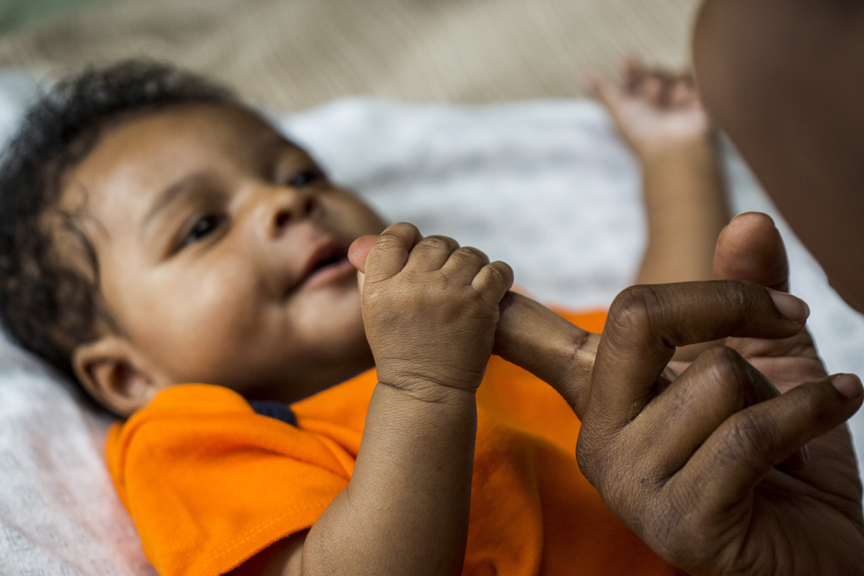- Behavior
- Education
- Health
Is your baby hitting developmental milestones?

In this article, you’ll find answers to questions like:
1. Should all kids develop at the same rate?
2. What percentage of kids are at risk for delays?
3. Who can help?
Within babies' first year of life, most are babbling, smiling, standing up and pointing. So how do they get there?
As parents, we often hear the term "developmental milestones" and know it’s important our children hit these markers at key moments of growth. But what exactly do child development specialists mean by that phrase?
1. SHOULD ALL KIDS DEVELOP AT THE SAME RATE?
“First, it’s important to remember that every child is an individual,” says Randee Gabriel, programs manager at 211 Palm Beach/Treasure Coast. “There are no two children that will hit every milestone at the exact same time. Still, there are crucial cues to look for at each age.”
Gabriel explains children up to age 5 should reach milestones in how they play, learn, speak, act and move (see chart below).
“This is because a young child’s brain develops incredibly quickly,” says Gabriel, adding a newborn’s brain is about a fourth the size of an adult brain. By age 3, the brain grows to 80 percent of adult size on its way to 90 percent by age 5.
Developmental milestones at a glance
Age | Gross motor | Fine motor | Cognitive, linguistic and communication | Social-emotional |
6 months | Sits up with no support; rolls over | Move toys between hands; reaches | Turns to voice or rattling sound; squeals | Responds to name; smiles when sees a parent |
1 year | Stands alone; pulls self to stand; takes steps with or without support | Puts block in cup; picks up objects with finger and thumb; points | Imitates vocalizations/ sounds; babbles; says single words | Waves hi or bye; imitates activities; plays pat-a-cake; follows simple commands |
2. WHAT PERCENTAGE OF KIDS ARE AT RISK FOR DELAYS?
One in four U.S. children up to age 5 are at moderate or high risk of developmental, behavioral, or social delay, according to the U.S. Centers for Disease Control and Prevention. In addition, many children experience delays in language or other areas that can affect school readiness.
“Every age group brings within itself new changes and skills required,” Gabriel says. “While a child may have no concerns at 6 months, this does not guarantee there will be no concerns at 25 months or 48 months or beyond. Rescreening at each interval is imperative to identify these shifts and ensure healthy development over the long term.”
3. WHO CAN HELP?
If you have questions or concerns about your child’s development, it's best to get help as soon as possible so any issues can be addressed early. Call 2-1-1 or chat online and ask for the Help Me Grow program. Help Me Grow services are free, including screenings, information and resource connection.
You can also call HomeSafe for a free screening at 561-383-9800.
SOURCES:
• Randee Gabriel, programs manager, 211 Palm Beach/Treasure Coast
• Centers for Disease Control and Prevention, U.S. Department of Health and Human Services
You May Also Like
-
- Parenting
- Safety
Tips on babyproofing your home
Expecting a baby? Read on to find out how best to prepare your home — and your life — for the big transition ahead. And if you’re on a tight budget, experts advise where to get aff …
Read More -
- Parenting
- Safety
Using the right car seat — correctly installed — saves lives
Did you know Florida law requires children up through age 5 to ride in safety or booster seats? Read on for more expert tips on what's best for your child at different ages. …
Read More -
- Behavior
- Health
- Parenting
BLOG: Talking to your baby is crucial for early development
Blog question: Does my baby understand when I speak to her? I’m not sure if she can understand what I am saying. Is it important for me to talk to my baby? …
Read More
Related resources
-
- Health
- Other
Florida KidCare/Healthy Kids
State-sponsored health and dental insurance for children through age 18
888-540-5437 Website -
- Education
- Health
Children's Medical Services
Early Steps, early intervention services for children up to 36 months who have or are at risk for significant developmental disabilities or delays
561-881-2822 Website -
- Behavior
- Education
- Health
211 Palm Beach Treasure Coast
Help Me Grow – information, guidance and developmental assessment of children up to age 8
2-1-1 Website Email -
- Parenting
- Safety
Safe Kids Palm Beach County
Local child safety information and assistance, including car seat installation, bike helmet fitting, poisoning prevention, TV tip-over prevention and more
561-841-3500 ext. 4011 Website Email -
- Health
- Other
- Parenting
Florida Department of Health – Palm Beach County
Maternal Child Health Division — services for pregnant women and families with babies, including nutrition information, nurse home visits, breastfeeding support and more
561-840-4500 Website Email -
- Health
Palm Beach Pediatric Society
An organization of Palm Beach County pediatricians, who are committed to meeting the physical and emotional needs of the children and young adults of Palm Beach County by providing the highest quality of care with compassion and honesty.
(561) 509-5009 Website
